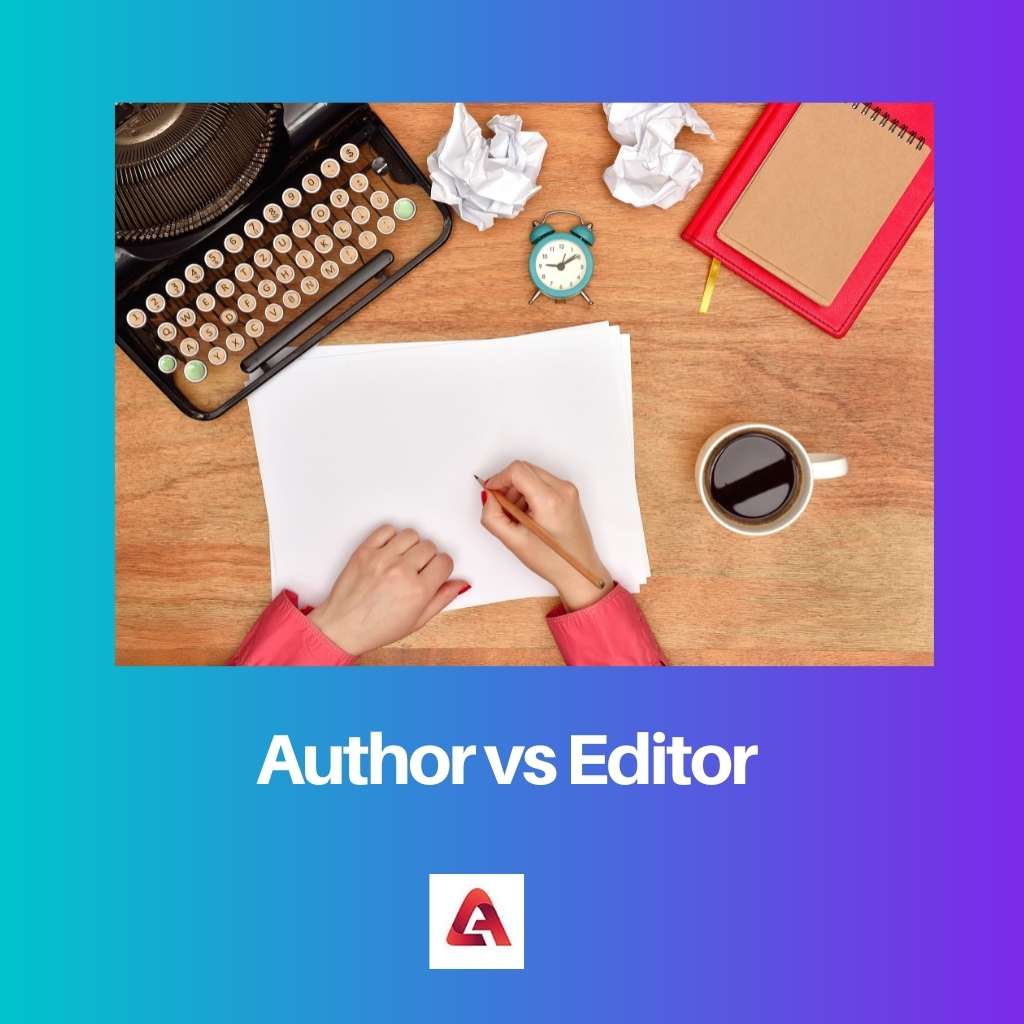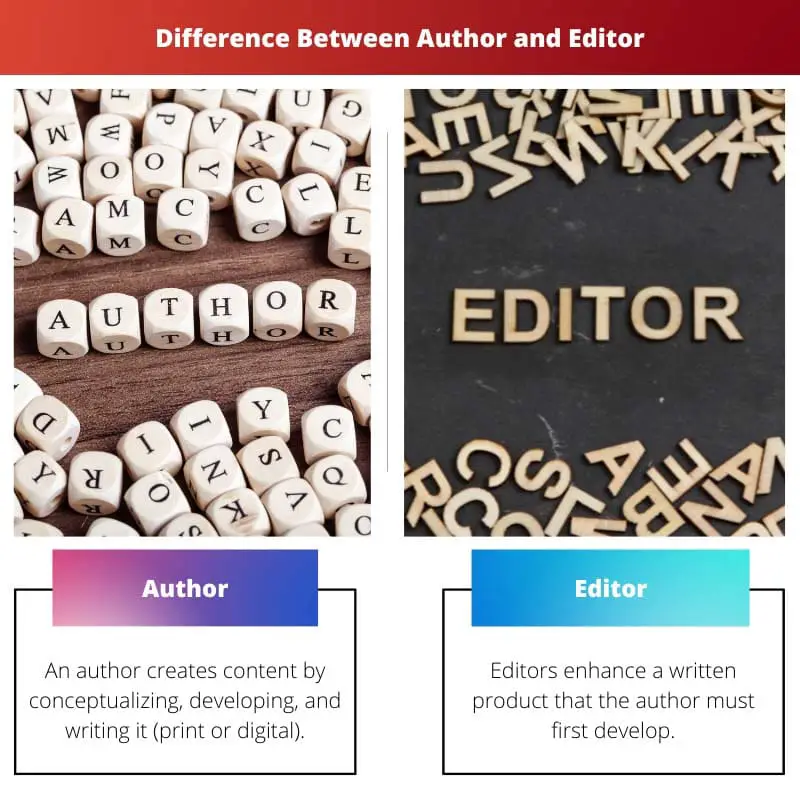Image-based media seems to be appearing to monopolize the information individuals consume in today’s current tech-driven culture.
The written word, however, continues to play an important role in defining modern culture, journalism, and entertainment.
For their development, such written materials rely on the knowledge of two specialized professionals: the editor and the author. Both are essential to the development of texts, yet their functions in the creative process are vastly different.
Key Takeaways
- Authors create original content, while editors review, revise, and refine written works to improve clarity, style, and overall quality.
- Authors take responsibility for the ideas and content within their work, whereas editors ensure consistency, accuracy, and adherence to guidelines.
- Editors collaborate with authors to shape the final version of a piece, working together to achieve the best possible outcome.
Author vs Editor
An author is someone who creates written work, such as books, articles, or essays. They are responsible for the content and structure of their work, and they use their own voice and style. An editor is someone who reviews and revises written work with the goal of improving its overall quality.

An author is a person who creates or originates any written work, such as a novel or a play. Authors must come up with, create, and communicate a concept.
They must be fluent in literature and related topics because they are the true producers of any work. They need communication, investigation, and discipline abilities.
An editor is an analytical reader, their role is to polish and develop a narrative or an article. Editors work in a wide range of businesses and for a wide range of goods, including periodicals, newspapers, blogs, and books.
Editors oversee double-checking information, spelling, grammar, and punctuation. They are also in charge of guaranteeing that content adheres to in-house style rules.
Comparison Table
| Parameters of Comparison | Author | Editor |
|---|---|---|
| Job Description | An author creates content by conceptualizing, developing, and writing it (print or digital) | Editors enhance a written product that the author must first develop. |
| Sub-Types | Fiction author or biographical author | Copy editor, freelance editor, or developmental editor |
| Required Skills | Communication, research, and discipline | Understanding of target audiences, management ability, language, and research |
| Roles | They are the initiators, which implies they play the most important role. | They are listed after the writers and hence serve a secondary function. |
| Educational Qualification | Creative writing major | Journalism or communication major |
What is Author?
An author, known as a writer or poet, is the creator or originator of any written work, such as a book or play and his or her authorship defines accountability for what was established.
Authors are the ones who create intellectual or creative work; specifically, one who writes a book, essay, poetry, drama, or other literary work for publication.
The term is derived from the Latin auctor, which means “authorizer, responsible actor, founder, or maker.”
To begin as an author, one must first conceive a concept for a book that would appeal to a certain audience and that one can comfortably write about with expertise.
If an author decides to produce a work of fiction, he or she must concentrate on developing a story, characters, and all other book aspects.
An author’s responsibilities include citing all sources and research utilized for a book, submitting draughts to editors throughout the process, completing all modifications
as needed by editors, as well as meeting all required publication requirements.
Communication and discipline are essential abilities for authors. Authors must be able to connect with their audience in addition to having proficiency with the written text and above-average command of their language.
Communication abilities enable them to provide pertinent messages in a captivating manner that piques the attention of readers.
Because writing is a solitary pursuit, authors work on their own time, outside of standard office locations. They must also be disciplined to effectively manage their schedule and stay on course while working.
Writers might work in an office or as independent contractors. They must fulfill deadlines and meet their goals following customer expectations.

What is Editor?
An editor is an analytical reader and word lover whose duty is to polish and enhance a story or article. Editors work in a wide range of businesses and for a wide range of goods, including periodicals, newspapers, blogs, and books.
Editors oversee double-checking information, spelling, grammar, and punctuation. They are also in charge of ensuring that content adheres to in-house style rules and feels polished and refined when completed.
Whether it’s a blog post on a site or a book, most of the published written items that individuals come across in their everyday lives have been edited.
The editor is the final line of defense in assessing whether a manuscript is ready for publication or dissemination.
The editor’s duty also includes determining what is suitable based on the media type, audience, and goal. These specialists not only proofread for spelling and grammatical issues
but also make recommendations on substance and style.
They must be able to judge if a statement is grammatically accurate quickly and confidently, even when under time constraints. With practice, editors grow more competent at detecting grammatical problems.
An editor must also make certain that any work that comes across their desk is factually correct and up to date. This may necessitate more investigation while they read the material.
The editor’s overall purpose is to ensure that the individual who ends up reading the material finds it easy to consume. As a result, the editor must be aware of the text’s readability
and be able to identify flaws that might hamper the reader’s comprehension.
Editors must guarantee that content is submitted on time and edited by a deadline, frequently while handling many assignments at the same time.

Main Differences Between Author and Editor
- An author conceptualizes, develops, and writes content while editors polish a written product.
- The types of authors include fiction authors or biographical authors, meanwhile types of editors are copy editors, freelance editors, or developmental editors.
- The skills required by an author include communication, research, and discipline, whereas the skills required for an editor include understanding of target audiences, management ability, language, and research.
- Authors play a primary role as they write content and editors play a secondary role as they edit content.
- The educational qualification of an author includes creative writing major while an editor includes a journalism or communication major.

- https://www.jstor.org/stable/43095742
- https://www.degruyter.com/document/doi/10.3138/9781487574383/html

This article clearly elucidates the key differences between the roles of an author and an editor. A very well-articulated piece.
It’s indeed fascinating to see how the responsibilities of authors and editors are juxtaposed against each other. A very illuminating read.
The article sets out a clear comparison between the roles of authors and editors, shedding light on the necessity of each in the creative process.
An insightful take on the roles of authors and editors in the writing process, each playing a crucial part in bringing the final written work to life.
Absolutely, both authors and editors are indispensable in producing high-quality written work.
The depth of analysis in explaining the roles of authors and editors is truly comprehensive and informative. Valuable insights have been shared.
This article provide a comprehensive analysis on the importance of authors and editors in creating written work and how their roles are vastly different. Each are equally important, despite their contributions varying.